(完整版)一般将来时态讲解及练习和答案
(完整版)一般将来时态讲解及练习和答案
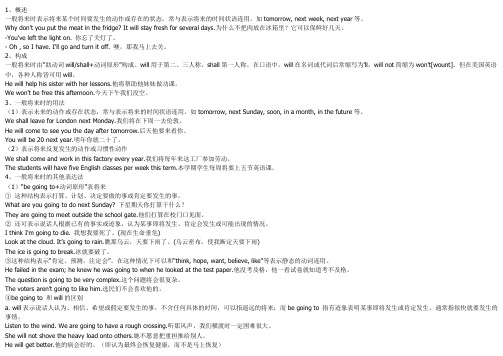
1、概述一般将来时表示将来某个时间要发生的动作或存在的状态,常与表示将来的时间状语连用,如tomorrow, next week, next year等。
Why don’t you put the meat in the fridge? It will stay fresh for several days.为什么不把肉放在冰箱里?它可以保鲜好几天。
-You've left the light on. 你忘了关灯了。
- Oh , so I have. I'll go and turn it off. 噢,那我马上去关。
2、构成一般将来时由“助动词will/shall+动词原形”构成。
will用于第二、三人称,shall第一人称。
在口语中,will在名词或代词后常缩写为'll,will not简缩为won’t[wount]。
但在美国英语中,各种人称皆可用will。
He will help his sister with her lessons.他将帮助他妹妹做功课。
We won't be free this afternoon.今天下午我们没空。
3、一般将来时的用法(1)表示未来的动作或存在状态,常与表示将来的时间状语连用,如tomorrow, next Sunday, soon, in a month, in the future等。
We shall leave for London next Monday.我们将在下周一去伦敦。
He will come to see you the day after tomorrow.后天他要来看你。
You will be 20 next year.明年你就二十了。
(2)表示将来反复发生的动作或习惯性动作We shall come and work in this factory every year.我们将每年来这工厂参加劳动。
一般将来时(讲义及答案)
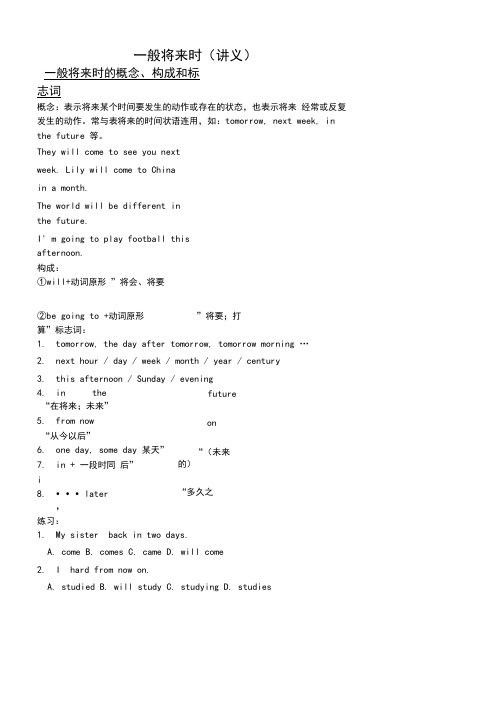
一般将来时(讲义)一般将来时的概念、构成和标志词概念:表示将来某个时间要发生的动作或存在的状态,也表示将来 经常或反复发生的动作。
常与表将来的时间状语连用,如:tomorrow, next week, inthe future 等。
They will come to see you nextweek. Lily will come to Chinain a month.The world will be different inthe future.I' m going to play football thisafternoon.构成:①will+动词原形 ”将会、将要②be going to +动词原形 ”将要;打算”标志词:1. tomorrow, the day after tomorrow, tomorrow morning…2. next hour / day / week / month / year / century3. this afternoon / Sunday / evening4. in the “在将来;未来”5. from now “从今以后”6. one day, some day 某天”7. in + 一段时同 后” i8. •••later ,练习:1. My sister back in two days.A. comeB. comesC. cameD. will come2. I hard from now on.A. studiedB. will studyC. studyingD. studies futureon“(未来的)“多久之3.后天Tcm将要离开北京-(翻径)_____________________4.中国将会变得更强大,(翻修)______________________5.They will visit Zhengzhou next month.(写出同义句)6.When will you leave for China (写出同义句)When you句式变换She will be angry with him.否定句:She will not be angry with him. /She won, t be angry with him. 一般疑问句:Will she be angry with him 回答:Yes, she will. / No, shewon , t.特殊疑问句:Who will she beangry with注意:will可缩写为'11, will not可缩写为won' t /wa u nt/练习:1.这个周末他不会去钓鱼。
(2021年整理)一般将来时讲解与练习

(完整版)一般将来时讲解与练习编辑整理:尊敬的读者朋友们:这里是精品文档编辑中心,本文档内容是由我和我的同事精心编辑整理后发布的,发布之前我们对文中内容进行仔细校对,但是难免会有疏漏的地方,但是任然希望((完整版)一般将来时讲解与练习)的内容能够给您的工作和学习带来便利。
同时也真诚的希望收到您的建议和反馈,这将是我们进步的源泉,前进的动力。
本文可编辑可修改,如果觉得对您有帮助请收藏以便随时查阅,最后祝您生活愉快业绩进步,以下为(完整版)一般将来时讲解与练习的全部内容。
(完整版)一般将来时讲解与练习编辑整理:张嬗雒老师尊敬的读者朋友们:这里是精品文档编辑中心,本文档内容是由我和我的同事精心编辑整理后发布到文库,发布之前我们对文中内容进行仔细校对,但是难免会有疏漏的地方,但是我们任然希望(完整版)一般将来时讲解与练习这篇文档能够给您的工作和学习带来便利。
同时我们也真诚的希望收到您的建议和反馈到下面的留言区,这将是我们进步的源泉,前进的动力。
本文可编辑可修改,如果觉得对您有帮助请下载收藏以便随时查阅,最后祝您生活愉快业绩进步,以下为〈(完整版)一般将来时讲解与练习〉这篇文档的全部内容。
(完整版)一般将来时讲解与练习五年级英语培优卷(二)姓名:___________________班级:___________________一般将来时一、一般将来时的定义: 表示将来某一个时间将要发生的动作或存在的状态,也表示将来经常或重复发生的动作.二、一般将来时的标志:tomorrow(明天),the day after tomorrow(后天)next year (明年)next month(下一个月), in the future(在将来)next week(下一个星期)in+ 一段时间(在……之后)三、一般将来时的构成:1。
主语+be(am,is,are) going to+动词原形+。
..。
例如:(1)I am going to play football tomorrow.明天我将要踢足球。
一般将来时讲解及练习
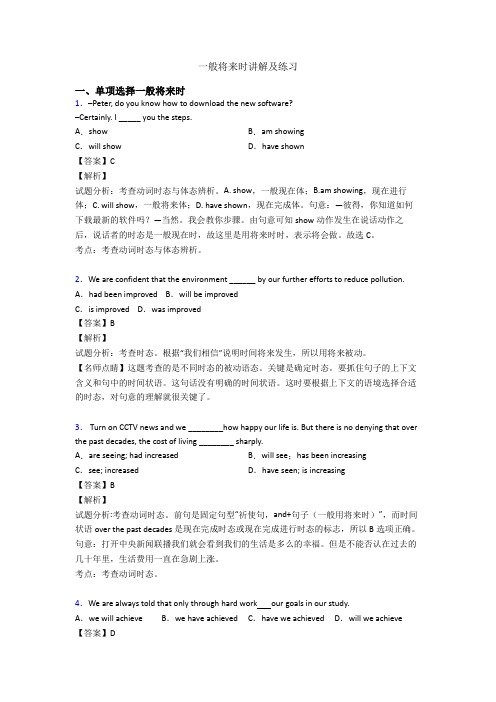
一般将来时讲解及练习一、单项选择一般将来时1.–Peter, do you know how to download the new software?–Certainly. I _____ you the steps.A.show B.am showingC.will show D.have shown【答案】C【解析】试题分析:考查动词时态与体态辨析。
A. show,一般现在体;B.am showing,现在进行体;C. will show,一般将来体;D. have shown,现在完成体。
句意:—彼得,你知道如何下载最新的软件吗?—当然。
我会教你步骤。
由句意可知show动作发生在说话动作之后,说话者的时态是一般现在时,故这里是用将来时时,表示将会做。
故选C。
考点:考查动词时态与体态辨析。
2.We are confident that the environment ______ by our further efforts to reduce pollution. A.had been improved B.will be improvedC.is improved D.was improved【答案】B【解析】试题分析:考查时态。
根据“我们相信”说明时间将来发生,所以用将来被动。
【名师点睛】这题考查的是不同时态的被动语态。
关键是确定时态。
要抓住句子的上下文含义和句中的时间状语。
这句话没有明确的时间状语。
这时要根据上下文的语境选择合适的时态,对句意的理解就很关键了。
3. Turn on CCTV news and we ________how happy our life is. But there is no denying that over the past decades, the cost of living ________ sharply.A.are seeing; had increased B.will see;has been increasingC.see; increased D.have seen; is increasing【答案】B【解析】试题分析:考查动词时态。
(英语)高中英语一般将来时解题技巧讲解及练习题(含答案)
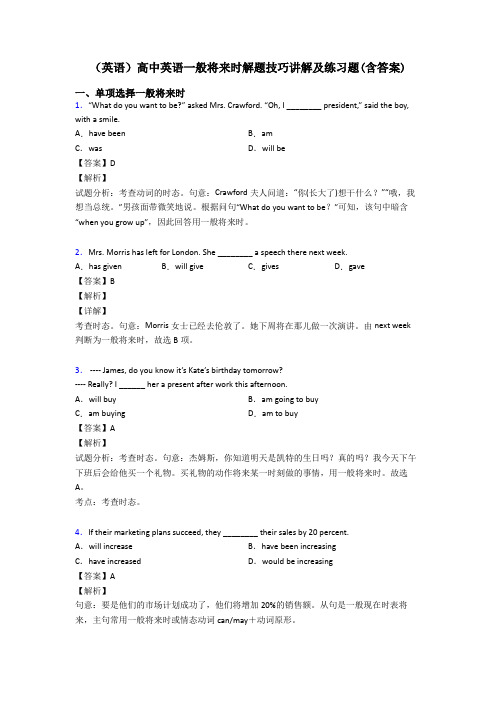
(英语)高中英语一般将来时解题技巧讲解及练习题(含答案)一、单项选择一般将来时1.“What do you want to be?” asked Mrs. Crawford. “Oh, I ________ president,” said the boy, with a smile.A.have been B.amC.was D.will be【答案】D【解析】试题分析:考查动词的时态。
句意:Crawford夫人问道:“你(长大了)想干什么?”“哦,我想当总统。
”男孩面带微笑地说。
根据问句“What do you want to be?”可知,该句中暗含“when you grow up”,因此回答用一般将来时。
2.Mrs. Morris has left for London. She ________ a speech there next week.A.has given B.will give C.gives D.gave【答案】B【解析】【详解】考查时态。
句意:Morris女士已经去伦敦了。
她下周将在那儿做一次演讲。
由next week 判断为一般将来时,故选B项。
3. ---- James, do you know it’s Kate’s birthday tomorrow?---- Really? I ______ her a present after work this afternoon.A.will buy B.am going to buyC.am buying D.am to buy【答案】A【解析】试题分析:考查时态。
句意:杰姆斯,你知道明天是凯特的生日吗?真的吗?我今天下午下班后会给他买一个礼物。
买礼物的动作将来某一时刻做的事情,用一般将来时。
故选A。
考点:考查时态。
4.If their marketing plans succeed, they ________ their sales by 20 percent.A.will increase B.have been increasingC.have increased D.would be increasing【答案】A【解析】句意:要是他们的市场计划成功了,他们将增加20%的销售额。
一般将来时讲解及练习(含答案)
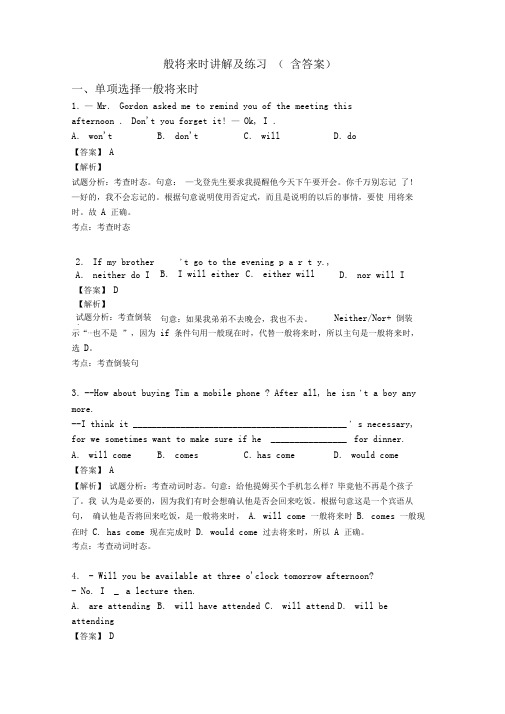
般将来时讲解及练习(含答案)一、单项选择一般将来时1.—Mr.Gordon asked me to remind you of the meeting thisafternoon .Don't you forget it! —Ok, I .A.won't B.don't C.will D.do【答案】A【解析】试题分析:考查时态。
句意:—戈登先生要求我提醒他今天下午要开会。
你千万别忘记了!—好的,我不会忘记的。
根据句意说明使用否定式,而且是说明的以后的事情,要使用将来时。
故A 正确。
考点:考查时态2.If my brother doesn 't go to the evening p a r t y.,A.neither do I B.I will either C.either willI D.nor will I【答案】D 【解析】试题分析:考查倒装句:句意:如果我弟弟不去晚会,我也不去。
Neither/Nor+ 倒装句,表示“⋯也不是”,因为if 条件句用一般现在时,代替一般将来时,所以主句是一般将来时,选D。
考点:考查倒装句3.--How about buying Tim a mobile phone ? After all, he isn 't a boy any more.--I think it _____________________________________________ ' s necessary, for we sometimes want to make sure if he ________________ for dinner. A.will come B.comes C.has come D.would come【答案】A【解析】试题分析:考查动词时态。
句意:给他提姆买个手机怎么样?毕竟他不再是个孩子了。
我认为是必要的,因为我们有时会想确认他是否会回来吃饭。
一般将来时语法规则及练习题(附答案)
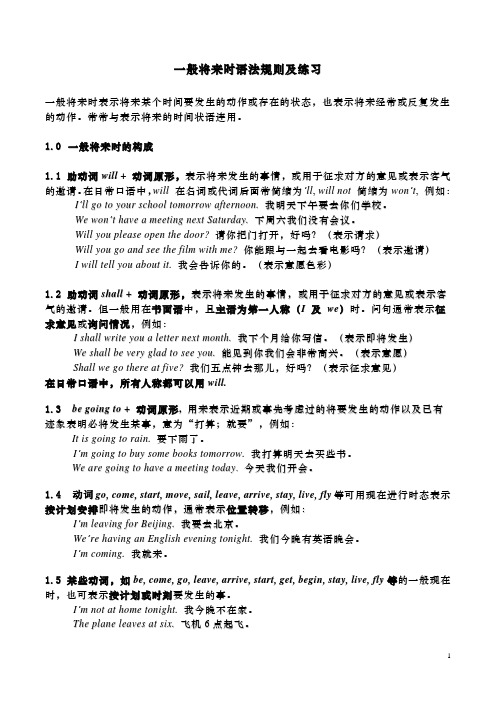
一般将来时语法规则及练习一般将来时表示将来某个时间要发生的动作或存在的状态,也表示将来经常或反复发生的动作。
常常与表示将来的时间状语连用。
1.0一般将来时的构成1.1助动词w i l l+动词原形,表示将来发生的事情,或用于征求对方的意见或表示客气的邀请。
在日常口语中,w i l l在名词或代词后面常简缩为’l l,w i l l n o t简缩为w o n’t,例如:I’l l g o t o y o u r s c h o o l t o m o r r o w a f t e r n o o n.我明天下午要去你们学校。
W e w o n’t h a v e a m e e t i n g n e x t S a t u r d a y.下周六我们没有会议。
W i l l y o u p l e a s e o p e n t h e d o o r?请你把门打开,好吗?(表示请求)W i l l y o u g o a n d s e e t h e f i l m w i t h m e?你能跟与一起去看电影吗?(表示邀请)I w i l l t e l l y o u a b o u t i t.我会告诉你的。
(表示意愿色彩)1.2助动词s h a l l+动词原形,表示将来发生的事情,或用于征求对方的意见或表示客气的邀请。
但一般用在书面语中,且主语为第一人称(I及w e)时。
问句通常表示征求意见或询问情况,例如:I s h a l l w r i t e y o u a l e t t e r n e x t m o n t h.我下个月给你写信。
(表示即将发生)W e s h a l l b e v e r y g l a d t o s e e y o u.能见到你我们会非常高兴。
(表示意愿)S h a l l w e g o t h e r e a t f i v e?我们五点钟去那儿,好吗?(表示征求意见)在日常口语中,所有人称都可以用w i l l.1.3b e g o i n g t o+动词原形,用来表示近期或事先考虑过的将要发生的动作以及已有迹象表明必将发生某事,意为“打算;就要”,例如:I t i s g o i n g t o r a i n.要下雨了。
(英语)初中英语一般将来时讲解与练习(含答案)

初中英语:一般将来时专项练习题1.Who will ________ to ________ at tomorrow’s meeting by the teacher?A.be told; say B.be asked; speak C.be told; talkD.be asked; tell【答案】B【解析】【详解】句意:在明天的会议上谁将被老师要求发言?考查动词辨析。
被要求发言,故用be asked;tell指告诉,speak指发言、演讲,故用speak。
故选B。
2.-The Big Parade(大阅兵) in Russia has made a big hit in the world and another one on September 3rd, 2015,in China.-Yes, I can't wait to meet the excitement.A.was held B.is heldC.has been held D.will be held【答案】D【解析】【详解】试题分析:句意:——俄国的大阅兵在世界上取得了很大成功,并且又一次大阅兵将在2015年九月三日在中国举行。
——我迫不及待地要满足兴奋。
根据语意句子用一般将来时的被动语态,故答案选D。
考点:考查时态和语态。
3.A hanfu show in Museum of History next week.A.is held B.was held C.will be held D.has been held【答案】C【解析】【详解】句意:汉服表演下周将在历史博物馆举行。
考查动词语态辨析。
next week下周,用于一般将来时;show是动词hold(举行)的受动者,需用被动语态,可排除ABD三项。
根据句意结构,可知选C。
4.Some new schools in Nanjing in the near future, which satisfies the citizens'needs for more resources.A.were built B.are built C.will build D.will be built 【答案】D【解析】【详解】句意:在不久的将来,南京将新建一些学校,这将满足市民对更多资源的需求。
一般将来时讲解(附习题+答案)

一般将来时讲解(附习题+答案)一、一般将来时的含义:表示动作发生在将来二、一般将来时的句型:(1) will/shall+动词原形(2) be going to+动词原形三、一般将来时的时间状语:tomorrow(明天)、the day after tomorrow(后天)、next...(下一...): next week(下一周)、next year(明年)、next month(下个月)in+一段时间(...之后): in three days(三天之后)、in the future在未来this evening(今天晚上)四、一般将来时的句型结构:(1) will/shall+动词原形(will not =won’t)(will 各种人称均可用,shall 只能用于第一人称)1)肯定句:主语+will/shall+动词原型...如:I will go to school tomorrow.我明天将会去学校He will go to school tomorrow.他明天将会去学校。
2)否定句:主语+will/shall+not+动词原型...如:I won’t go to school tomorrow.我明天将不会去学校。
He won’t go to school tomorrow.他明天将不会去学校。
3)一般疑问句:Will/Shall +主语+动词原型...如:Will you go to school tomorrow?你明天要去学校吗?Will he go to school tomorrow?他明天要去学校吗?肯定回答:Yes, 主语+will.如:Yes, I will.Yes, he will.否定回答:No,主语+will+not.如:No, I won’t.No, he won’t.4) 特殊疑问句:特殊疑问词+will/shall+主语+动词原型...如:What will you do tomorrow?你明天将会做什么?What will he do tomorrow?他明天将会做什么?(2) be going to+动词原形1)肯定句:主语+be going to +动词原型...如:I am going to buy some books tomorrow.我明天打算去买一些书。
(完整版)英语将来时态讲解、练习、答案

将来时表示法一般将来时表示在将来某个时间要发生的动作或存在的状态。
表示“将来”的句式很多,常用的句式及用法归纳如下:一、be going to+动词原形(专题与will的区别)1.这种结构表示主体现在打算在最近或将来要做某事。
这种打算往往是事先考虑好的。
如:My brother is going to learn English next year. 我哥哥准备明年学英语。
I am going to meet Tom at the station at six. 我六点钟要到火车站去接汤姆。
2.这种结构还可以表示说话人根据已有的迹象认为非常可能即将发生某事。
如:Look at these black clouds——it is going to rain. 看这些乌云——要下雨了。
I’m afraid I’m going to have a bad cold. 恐怕我要得重感冒了。
注意:1. 如果be going to后接的是形容词或副词(there)时,其后应加上be,然后再接形容词或副词。
如:I’m going to be busy this Sunday. 这个星期天我很忙2. there be句型也可用于这种句型中,但there不能和have连用。
如:There is going to be an English film this evening. 今天晚上有一场英文电影。
二、shall/ will+动词原形。
在书面语中,第一人称常用shall, 但在口语中,所有人称都可用will.1.will/ shall均可表示单纯的将来。
如:The radio says it will be cloudy tomorrow. 收音机报道明天多云。
2.表示预料中将要发生的动作或情况。
如:You’ll feel better after having this medicine.吃了这药,你就会感到好些的。
精选初中英语一般将来时讲解与练习(含答案)

初中英语:一般将来时专项练习题1.–But where are the books? -Don’t worry. They ____ here in no time.A.have sent B.will be sent C.are sending D.have been sent【答案】B【解析】【详解】句意:-但是书在哪里呢?-不要担心,它们将马上被送到这里来。
动词send意为“发送”,A是其现在完成时形式,B是其一般将来时的被动语态,C是其现在进行时,D是其现在完成时的被动语态。
they 指的是“books”(书),书只能被发送,需要使用被动语态,排除AC,后者让前者不要担心说明书还没有来,将会被送来,所以适合使用一般将来时的被动语态will be sent,故选B。
2.Study hard , then your dream will _____.A.realize B.realizing C.be realized【答案】C【解析】【详解】试题分析:句意:努力学习,你的梦想将会实现。
根据句意及题干分析此题应用被动语态,其基本结构式be+动词的过去分词,所以选C。
考点:考查被动语态的用法3.A new zoo in our town center next month. I think it will be a good place for the teenagers to see the animals.A.build B.will build C.will be built【解析】【详解】句意:下个月我们市中心将建一个新动物园。
我想这对青少年来说是个看动物的好地方。
考查动词时态。
build建造,原形; will build将建造,一般将来时;will be built将被建造,这里是一般将来时的被动语态。
根据“next month.”可知用一般将来时,主语是“A new zoo”可知,这里是一般将来时的被动语态,其结构是will be done的形式。
中考一般将来时态讲解及习题和答案
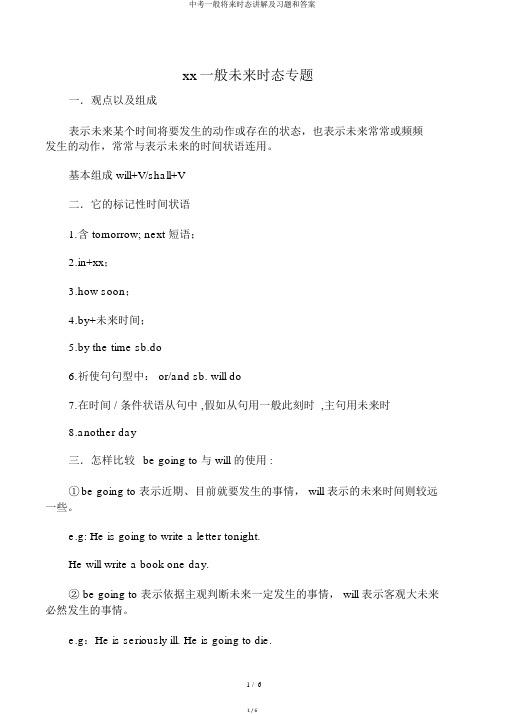
xx一般未来时态专题一.观点以及组成表示未来某个时间将要发生的动作或存在的状态,也表示未来常常或频频发生的动作,常常与表示未来的时间状语连用。
基本组成 will+V/shall+V二.它的标记性时间状语1.含 tomorrow; next 短语;2.in+xx;3.how soon;4.by+未来时间;5.by the time sb.do6.祈使句句型中: or/and sb. will do7.在时间 / 条件状语从句中 ,假如从句用一般此刻时 ,主句用未来时8.another day三.怎样比较be going to 与 will 的使用 :①be going to 表示近期、目前就要发生的事情, will 表示的未来时间则较远一些。
e.g: He is going to write a letter tonight.He will write a book one day.② be going to 表示依据主观判断未来一定发生的事情, will 表示客观大未来必然发生的事情。
e.g:He is seriously ill. He is going to die.He will be twenty years old.③ be going to含有“计划,准备”的意思,而will则没有这个意思,e.g:She is going to lend us her book.He will be here in half an hour.④在有条件从句的主句中,不用 be going to,而用 will, e.g:Ifany beasts come at you, I'll stay with you and help you.四.主将从现详讲定义: if 指引的条件状语从句中,主句用未来时态,从句用此刻时态。
If是连词,所连结的句子叫条件状语从句,表示假定或条件,意思是“假如的话”。
初中英语主要时态 一般将来时讲解及练习
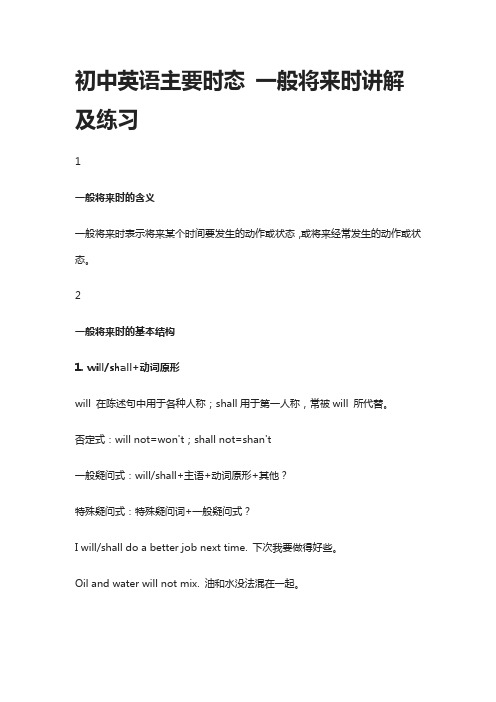
初中英语主要时态一般将来时讲解及练习1一般将来时的含义一般将来时表示将来某个时间要发生的动作或状态,或将来经常发生的动作或状态。
2一般将来时的基本结构1. will/shall+动词原形will 在陈述句中用于各种人称;shall用于第一人称,常被will 所代替。
否定式:will not=won't;shall not=shan't一般疑问式:will/shall+主语+动词原形+其他?特殊疑问式:特殊疑问词+一般疑问式?I will/shall do a better job next time. 下次我要做得好些。
Oil and water will not mix. 油和水没法混在一起。
—Will he help you with your English tonight? 今天晚上他会帮助你学习英语吗?—Yes, he will./No, he won't. 是的,他会。
/不,他不会。
—When will you arrive for America? 你什么时候去美国?—Tomorrow. 明天。
2. am/is/are going to +动词原形否定式:am/is/are not going to +动词原形一般疑问式:am/is/are +主语+ going to + 动词原形+其他?特殊疑问式:特殊疑问词+一般疑问式?He is going to spend his holidays in London. 他打算在伦敦度假。
Look at the dark clouds. There is going to be a storm. 看那乌云,快要下雨了。
Is he going to collect any data for us? 他会帮我们收集数据吗?What are you going to do tomorrow? 明天你打算作什么?3一般将来时的用法will+动词原形与am/is/are going to +动词原形的用法虽然都表示将来发生动作或情况,一般情况下能互换。
(英语)英语一般将来时解题技巧讲解及练习题(含答案)及解析
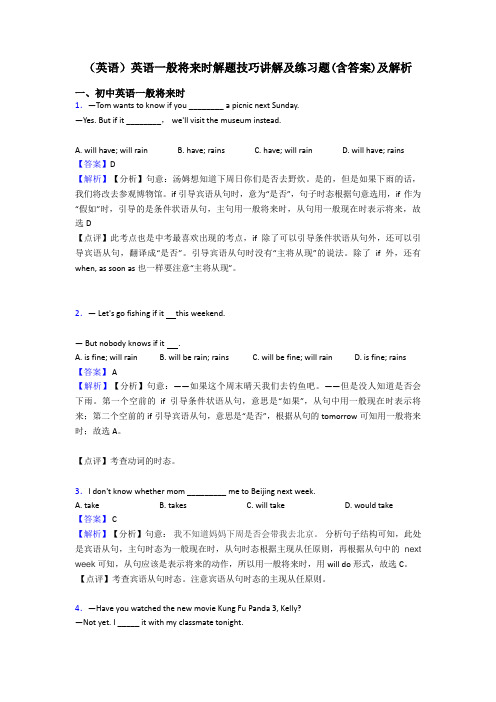
(英语)英语一般将来时解题技巧讲解及练习题(含答案)及解析一、初中英语一般将来时1.—Tom wants to know if you ________ a picnic next Sunday.—Yes. But if it ________, we'll visit the museum instead.A. will have; will rainB. have; rainsC. have; will rainD. will have; rains【答案】D【解析】【分析】句意:汤姆想知道下周日你们是否去野炊。
是的,但是如果下雨的话,我们将改去参观博物馆。
if引导宾语从句时,意为“是否”,句子时态根据句意选用,if 作为“假如”时,引导的是条件状语从句,主句用一般将来时,从句用一般现在时表示将来,故选D【点评】此考点也是中考最喜欢出现的考点,if除了可以引导条件状语从句外,还可以引导宾语从句,翻译成“是否”。
引导宾语从句时没有“主将从现”的说法。
除了if外,还有when, as soon as也一样要注意“主将从现”。
2.— Let's go fishing if it this weekend.— But nobody knows if it .A. is fine; will rainB. will be rain; rainsC. will be fine; will rainD. is fine; rains 【答案】 A【解析】【分析】句意:——如果这个周末晴天我们去钓鱼吧。
——但是没人知道是否会下雨。
第一个空前的if引导条件状语从句,意思是“如果”,从句中用一般现在时表示将来;第二个空前的if引导宾语从句,意思是“是否”,根据从句的tomorrow可知用一般将来时;故选A。
【点评】考查动词的时态。
3.I don't know whether mom _________ me to Beijing next week.A. takeB. takesC. will takeD. would take【答案】 C【解析】【分析】句意:我不知道妈妈下周是否会带我去北京。
[最新版]初中英语一般将来时讲解与练习(含答案)
![[最新版]初中英语一般将来时讲解与练习(含答案)](https://img.taocdn.com/s3/m/ffa792ced4bbfd0a79563c1ec5da50e2524dd13f.png)
初中英语:一般将来时专项练习题1.The number of the elderly(老人) increasing in China, and with the development of China economy,they better care of in the future. A.is; will take B.are; are taken C.is; will be taken D.are; will take【答案】C【解析】【详解】句意:中国老年人的数量在不断增加,随着中国经济的发展,他们将得到更好的照顾。
the number of表示“……的数量”,跟复数名词连用作主语时,中心词是number,谓语动词要用单数形式,首先排除B,D;they与动词词组take care of 之间是被动的关系,故答案为C。
2.—Who’ s the little girl in the picture? —It’s me. It at the age of 3. A.took B.is taken C.was taken【答案】C【解析】【详解】试题分析:句意:—照片中的这个小女孩是谁?—是我。
它是在三岁时照的。
主语it是动作take的承受者,故用被动语态;据at the age of 3可知句子用一般过去时,故句子要用一般过去时的被动语态。
故选C。
考点:考查一般过去时的被动语态。
3.You will ________ according to ________ work you do. A.pay...the amount of B.pay...an amount ofC.be paid...the amount of D.be paid....an amount of【答案】C【解析】【详解】句意:将根据你的工作量给你支付工资。
考查被动语态。
根据句意可知,“你”和“支付”之间是被动关系,一般将来时的被动语态是will be+动词过去分词,故排除A、B;the amount of ……的数量;an amount of大量的,根据句意,这里指的是工作的量,故用the amount of。
一般将来时知识点总结及经典习题(含答案)

14.-- Tommy, do you know if they _____ to the zoo this Sunday if it _____?
-- Sorry, I have no idea.
【点评】考查动词的时态。
15.—Have you finished the poster for the party?
—Not yet. Iit in two days.
A. finish B. finished C. will finish D. have finished
【答案】C
【解析】【分析】此题的关键点在“in two days”和一般将来时连用,故选C。句意是:—你已经完成聚会的海报了吗?—还没有,我会在两个以后完成的。
A. will come; will come B. will come; comes C. comes; will come
【答案】A
【解析】【分析】句意:——你知道怀特太太今晚是否来吃晚饭吗?——不知道。但我认为如果她有空,她会来。空一,句子为含有宾语从句的主从复合句,主句是一般现在时,从句用它所需要的任何时态,根据this evening今晚,可知句子为一般将来时,will come;空二,回答是when引导的时间状语从句,从句是一般现在时,主句应用将来时,will come,故选A。
12.Many scientists believe that robotsable to talk like humans in 50 years.
A. were B. are C. will be D. have been
- 1、下载文档前请自行甄别文档内容的完整性,平台不提供额外的编辑、内容补充、找答案等附加服务。
- 2、"仅部分预览"的文档,不可在线预览部分如存在完整性等问题,可反馈申请退款(可完整预览的文档不适用该条件!)。
- 3、如文档侵犯您的权益,请联系客服反馈,我们会尽快为您处理(人工客服工作时间:9:00-18:30)。
1、概述一般将来时表示将来某个时间要发生的动作或存在的状态,常与表示将来的时间状语连用,如tomorrow, next week, next year等。
Why don’t you put the meat in the fridge? It will stay fresh for several days.为什么不把肉放在冰箱里?它可以保鲜好几天。
-You've left the light on. 你忘了关灯了。
- Oh , so I have. I'll go and turn it off. 噢,那我马上去关。
2、构成一般将来时由“助动词will/shall+动词原形”构成。
will用于第二、三人称,shall第一人称。
在口语中,will在名词或代词后常缩写为'll,will not简缩为won’t[wount]。
但在美国英语中,各种人称皆可用will。
He will help his sister with her lessons.他将帮助他妹妹做功课。
We won't be free this afternoon.今天下午我们没空。
3、一般将来时的用法(1)表示未来的动作或存在状态,常与表示将来的时间状语连用,如tomorrow, next Sunday, soon, in a month, in the future等。
We shall leave for London next Monday.我们将在下周一去伦敦。
He will come to see you the day after tomorrow.后天他要来看你。
You will be 20 next year.明年你就二十了。
(2)表示将来反复发生的动作或习惯性动作We shall come and work in this factory every year.我们将每年来这工厂参加劳动。
The students will have five English classes per week this term.本学期学生每周将要上五节英语课。
4、一般将来时的其他表达法(1)“be going to+动词原形”表将来①这种结构表示打算、计划、决定要做的事或肯定要发生的事。
What are you going to do next Sunday? 下星期天你打算干什么?They are going to meet outside the school gate.他们打算在校门口见面。
②还可表示说话人根据已有的事实或迹象,认为某事即将发生、肯定会发生或可能出现的情况。
I think I'm going to die. 我想我要死了。
(现在生命垂危)Look at the cloud. It’s going to rain.瞧那乌云,天要下雨了。
(乌云密布,使我断定天要下雨)The ice is going to break.冰就要破了。
③这种结构表示“肯定、预测,注定会”。
在这种情况下可以和“think, hope, want, believe, like”等表示静态的动词连用。
He failed in the exam; he knew he was going to when he looked at the test paper.他没考及格,他一看试卷就知道考不及格。
The question is going to be very complex.这个问题将会很复杂。
The voters aren’t going to like him.选民们不会喜欢他的。
④be going to 和will的区别a. will表示说话人认为、相信、希望或假定要发生的事,不含任何具体的时间,可以指遥远的将来;而be going to 指有迹象表明某事即将发生或肯定发生,通常指很快就要发生的事情。
Listen to the wind. We are going to have a rough crossing.听那风声,我们横渡时一定困难很大。
He is gong to get better.他的病就会好了。
(指有恢复的迹象)b. be gong to 和will均可表示意图,但事先考虑过的意图用be going to,不是事先考虑过的意图用will。
-Why have you torn the paper into pieces?你怎么把论代撕了?- I am going to rewrite it.(事先考虑,不用will)我要重写。
-Is it really a big stone?-I will help you to move it.(未经事先考虑,不用be going to )He will go his own way.他一意孤行。
I won't do so.我不愿这样做。
c. be going to可以用在条件状语从句中表示将来,而will不能。
If you are going to attend the meeting, you’d better leave now.如果你要去参加这个会,你最好现在走。
(不用will)If you are going to accept the job, start to work now.如果你想接受这项工作,从现在开始上班。
(不用will)(2)用现在进行时来表示将来①现在进行时表示按计划、安排即将发生的动作,这一结构常用于表示位置转移的动词,如come , go , leave, start ,move, arrive等,还有join, play, eat, work, return, take, wear, stay, sleep, meet等。
常与表示将来的时间状语连用。
I'm leaving for Tibet on Sunday.星期天我要去西藏。
When are you going back to your factory? 你什么时候回工厂?He is not coming.他不来了。
They are arriving tomorrow afternoon.他们明天下午到达。
②进行时表示将来与be going to 的区别be going to表示说话前事先考虑过的意图(intend),现在进行时表示事先安排的动作(plan);表示有迹象表明某事即将发生或肯定发生用be going to,不用现在进行时。
Mary and Jane are going to meet tonight.(have an intention to)Mary and Jane are meeting tonight.( 事先安排的动作)I feel dizzy, I think I am going to faint.(不能用I fainting)我感到头晕,我想我要昏倒。
(3)“be about to+动词原形”表将来“be about to+动词原形”表示打算或据安排即将发生的动作。
它不与表示时间的副词或其他时间状语连用。
The English evening is about to start.英语晚会即将开始。
They are about to set out.(不能说,They are about to set out soon) 他们就要出发。
The ship is about to sail.轮船马上就要启航。
比较:be about to 与be not about to 的差异be about to 意为“正要、马上就”;be not about to 意为“不愿意……”。
He is about to come out. Please wait a moment.他马上就出来,请稍等。
He is not about to do that again.他不愿再做那件事了。
(4)“be to+动词原形”表将来“be to+动词原形”表示约定的、计划中的或按职责、义务要求要发生的动作,这种动作通常是人的意志所能控制的,或用于征求意见。
There's to be a slide show this afternoon.今天下午要放幻灯。
(5)一般现在时表示将来用一般现在时表示根据规定预计要发生、安排或计划好的将来的动作。
这一结构常用于表示位置转移的动词,如come, go, leave, start, begin, sail, return, stop, end, open, stay等。
The plane starts at 8 o'clock in the morning.飞机上午8点起飞。
When does the show begin?展览什么时候开始?一般将来时一、一般将来时表示将要发生的动作或存在的状态及打算、计划或准备做某事。
一般将来时由助动词shall或will加动词原型构成,shall用于第一人称,will用于第二、三人称。
二.时间状语:tomorrow, next day(week, month, year…),soon, in a few minutes, by…,the day after tomorrow, etc.三.基本结构:1、肯定句主语+am/is/are+going to + do;will/shall + do.2.否定形式:am/is/are not going to do ;will/shall not do。
3.一般疑问句:be放于句首;will/shall提到句首。
例句:They are going to have a competition with us in studies.他们将有一场比赛和我们一起研究。
It is going to rain.天要下雨了。
四、注意1、在时间或条件状语从句中,一般不能用将来时态,而用现在时态代替:They’ll fight till they win complete victory.I’ll be round to see you if i have time tomorrow.①.be going +不定式(表打算、准备作的事或即将发生或肯定要发生的事):We’re going to put up a building here.How are you going to spend your holiday?who is going to speak first?②. be +不定式(表示按计划安排要发生的事或用来征求对方的意见):When is the factory to go into production?The line is (going) to be opened to traffic next week.Am I to (=shall i ) go on with the work?③.一般现在时(限于某些动词,表示按计划或时刻要发生的事):School finishes on January 18th.We get off at the next stop.When does the winter vacation begin?④.现在进行时(限于某些动词,表示按计划安排要发生的事):We are having an English evening tonight.They are playing some folk music next.I am talking the children to the zoo (on Sunday ).3、在表示打算或准备时,如不提时间、条件等,多用be going to这个结构,用一般将来时时很少的,特别是在口语中:He is going to buy a dictionary.(很少说He will buy a dictionary.)在谈即将发生的情况时,用be going to 这个结构也多一些。
